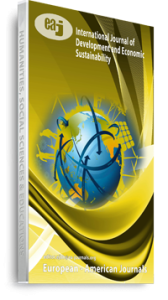The study examined the impact of trade openness and human capital investment on economic growth in Nigeria from 1981 to 2020 and employed error correction mechanism for the analysis. Economic growth was proxied by nominal gross domestic product. Human capital investment was decomposed into government capital expenditure on education, government recurrent expenditure on education, government capital expenditure on health and government recurrent expenditure on health while trade openness was measured by trade openness index. Exchange rate was used as check variable. The study carried out descriptive statistics test, Augmented Dickey-Fuller unit root test, Johansen co-integration test and Error Correction Mechanism (ECM) technique for the analysis. The result revealed that capital component of government expenditure on health and education were negatively related to national output during the period of investigation. However, the recurrent component of government on both health and education as well as trade openness were positively related to economic growth for the period. The study recommended among others that Government should increase funding in education and health sectors to meet the 20% to 15% benchmark recommended by UNESCO and WHO respectively and adopt the private sector model of payment that is based on milestone achieved in capital projects in both sectors.
Citation: Timothy Kabari Kerebana and Itode James Krama (2021) Trade Openness, Human Capital Investment and Economic Growth in Nigeria, International Journal of Development and Economic Sustainability, Vol.9, No.3, pp.57-71
Keywords: Human Capital Investment, economic growth, trade openness

